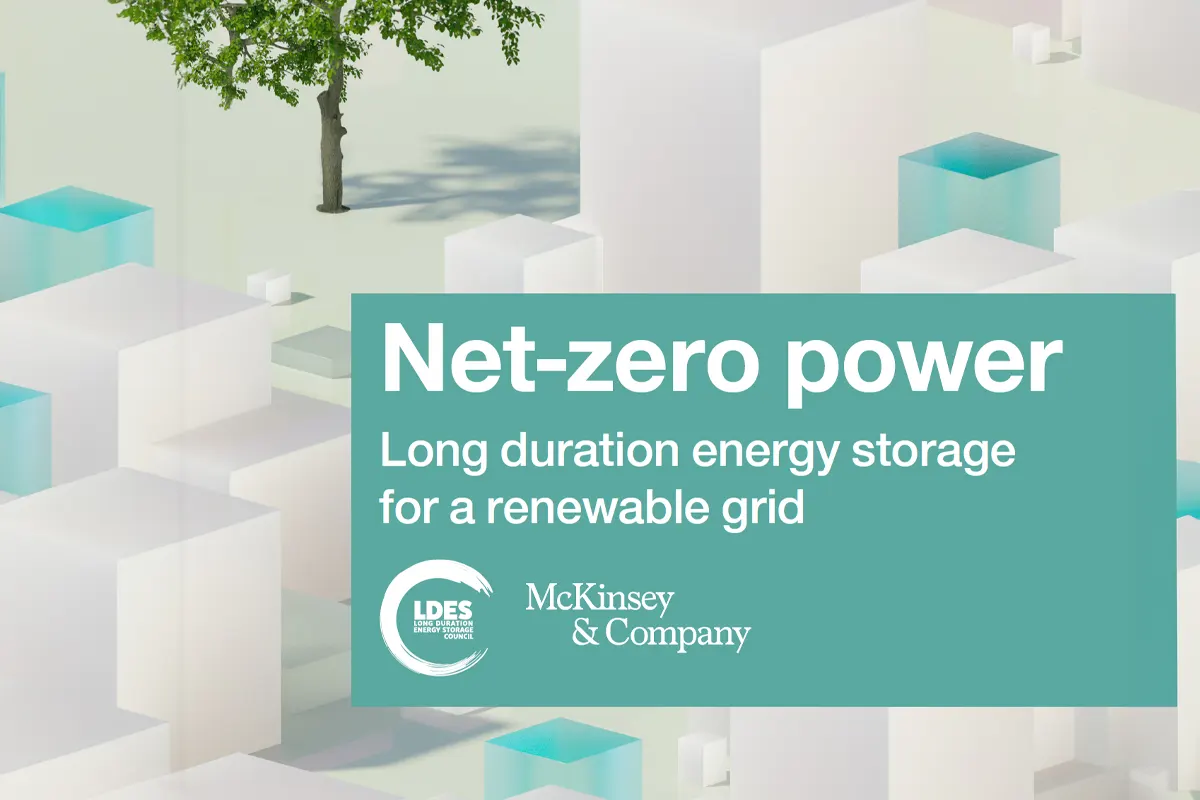85-140 terawatt-hours (TWh) representing $1.5–$3 trillion in investment, coupled with market reforms, yields pathway to full electric grid decarbonization
HOUSTON, Nov. 23, 2021 — Today, the recently formed Long Duration Energy Storage Council (LDES Council) — of which Quidnet Energy is a founding member — released a groundbreaking study documenting the importance of long-duration energy storage to enabling the global transition of electric systems to operate entirely without fossil fuels.
Conducted by McKinsey & Company, the study included actual pricing and projection data from the
leading long-duration energy storage companies in the world today. It assessed what it will take for
evolving storage technologies to enable a fully decarbonized electric grid. Results are based on advanced power systems modeling using more than 10,000 real datapoints supplied by technology providers.
The study concludes that 85–140 terawatt-hours (TWh) of LDES (defined as a technology that efficiently stores energy for greater than eight hours) needs to be deployed globally to enable power grids to become carbon net-zero.
“This report provides a much clearer path than ever before about what it will take to transition to a zero carbon electric grid over the next 20 years,” said Quidnet’s CEO Joe Zhou. “It demonstrates we can run the system entirely without oil and gas peakers to balance renewable energy variability, and it lays out a path to get there. Our entire team is thrilled about how this report highlights the criticality of rapidly advancing LDES technologies like Quidnet’s and those of our sister companies.”
The LDES Council announced its formation during the Conference of Parties (COP) 26 Conference in Glasgow, Scotland on November 4, 2021. The LDES Council is a CEO-led initiative, uniting energy companies, technology providers and investors. Its mission is to cut carbon emissions through the deployment of long duration energy storage technologies such as Quidnet’s innovative Geomechanical Pumped Storage solution.
The report includes timeline scenarios for LDES deployment that coincide with recent pledges to
decarbonize nationally, including the commitments by the United States, United Kingdom, Australia, and India. Achieving the proposed 85–140 TWh of LDES, which would account for 10% of electricity consumed worldwide, will require an estimated investment of $1.5 trillion to $3 trillion. This represents between five and eleven times the total investment in renewable power in 2020.
###
About Quidnet Energy
Based in Houston, Texas, Quidnet’s patented Geomechanical Pumped Storage (GPS) technology utilizes excess renewable energy to store water beneath ground under pressure. When renewable energy is not producing, this pressurized water drives hydroelectric turbines producing electricity to support the grid at a fraction of the cost of Li ion and for much longer duration. Quidnet’s technology is an adaptation of centuries-old gravity-powered “pumped storage,” but without the massive land requirements and reliance on elevated terrain.
For more information, please visit quidnetenergy.com.
About the LDES Council
The Long Duration Energy Storage Council (LDES Council) is a global, CEO-led organization that strives to accelerate decarbonization of the energy system at lowest cost to society by driving innovation, commercialization, and deployment of long duration energy storage.
The LDES Council provides fact-based guidance and information to governments, industry, and broader society, drawing from the experience of its members, which include leading energy companies, technology providers, investors, and end-users.
LDES Council founding members (24):
Alfa Laval, Ambri, Azelio, Baker Hughes, BP, Breakthrough Energy, CellCube, Ceres Power Holdings PLC, Echogen Power Systems, Energy Dome, Enlighten Innovations Inc., EOS Energy Enterprises, Inc., ESS Inc., e-Zinc, Form Energy, Inc., Greenko Group, Highview Power, Malta Inc., NEOM, Quidnet Energy, Redflow Limited, Rio Tinto, Siemens Energy, Stiesdal
For more information, please visit https://www.ldescouncil.com/.
To read the LDES Council’s report, please visit https://www.ldescouncil.com/publication.

